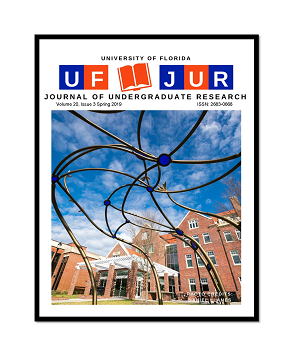Feasts and Famine: Modern Misconceptions of the Ancient Roman Diet
DOI:
https://doi.org/10.32473/ufjur.v20i3.106249Abstract
Ancient sources, modern scholarship, and modern popular media have misled audiences about the truth of the typical diet of the Roman lower strata. Modern movies and books, as well as ancient satire, a popular cultural medium of its time, put forth a stereotype of the lifestyle of rich citizens of Imperial Rome as contrasted with the poor Romans’ humble fare. Modern media, influenced by ancient satire, plays into stereotypes of the Imperial Romans stuffing themselves on dormice and grapes while their servants go hungry. The misconception in modern media may be created by a misreading of ancient satire, which is critical in nature. When the critical aspect of satire is misinterpreted, the elaborate and excessive meals are taken at face value rather than read as symbolic. In ancient satires, the depictions of both simple meals and fantastic banquets are exaggerated and must be interpreted as symbolic of the character serving or eating the meal.
Modern representations of the ancient Romans’ diet, inaccurately influenced by ancient literature such as the satires of Horace, Juvenal, and Petronius, differ from recent findings of archaeologists in Herculaneum and Pompeii. The modern misrepresentation seems to come from a mistake in equating the food symbolic of the Roman upper strata with high nutritional value as well as equating the food symbolic of the lower strata to low nutritional value. An analysis of the food depictions in ancient literature and recent archeological findings suggest that poor Romans ate a healthier and more varied diet than is commonly believed.
Metrics
References
Bisel, Sarah. "Human Bones at Herculaneum". Rivista di study pompeiani 1, (1987): 123-129.
Botte, Emmanuel and Victoria Leitch. Fish & ships: production et commerce des salsamenta durant l'Antiquité: actes de l'atelier doctoral. Rome Arles: Éditions Errance, 2014.
Cicero. On Ends. Translated by H. Rackham. Cambridge: Harvard University Press, 1914.
Craig, Oliver E., Luca Bondioli, Luciano Fattore, Thomas Higham, and Robert E. M. Hedges. "Evaluating marine diets through radiocarbon dating and stable isotope analysis of victims of the AD79 eruption of Vesuvius," American Journal of Physical Anthropology 152, no. 3 (2013): 345-352.
Garnsey, Peter, and Walter Scheidel. Cities, Peasants and Food in Classical Antiquity: Essays in Social and Economic History. Cambridge: Cambridge University Press, 2009.
Muecke, Frances. Horace Satires II. Warminster, England: Aris & Phillips, 1997.
Juvenal. The Satires. Translated by Niall Rudd. Oxford: Oxford University Press, 1992.
Morley, Neville. “The poor in the city of Rome.” In Poverty in the Roman World, edited by Margaret Atkins and Robin Osborne. Cambridge: Cambridge University Press, 2009.
Pharr, Mary F., and Leisa A. Clark. Of Bread, Blood and The Hunger Games. McFarland, 2012.
Shelton, Jo-Ann. As the Romans did a sourcebook in Roman social history. New-York: Oxford University Press, 1998.
Wallace-Hadrill, Andrew. Herculaneum: past and future. London: Frances Lincoln, 2012.
Wallace-Hadrill, Andrew. The Other Pompeii: Life & Death in Herculaneum. Directed by Paul Elston. England: BBC, 2013. Video.
Wilkins, John, and Robin Nadeau. A companion to food in the Ancient World. New York, NY: Wiley Blackwell, 2015.
Downloads
Published
Issue
Section
License
Some journals stipulate that submitted articles cannot be under consideration for publication or published in another journal. The student-author and mentor have the option of determining which journal the paper will be submitted to first. UF JUR accepts papers that have been published in other journals or might be published in the future. It is the responsibility of the student-author and mentor to determine whether another journal will accept a paper that has been published in UF JUR.

